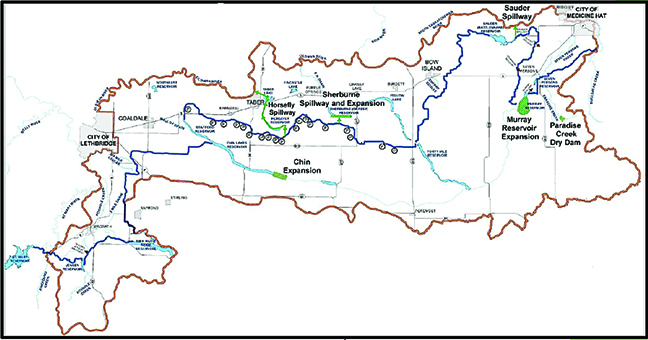Current Temperature
Ag conference focuses on farm to table
Posted on November 30, 2023 by Ryan Dahlman Southern Alberta Newspapers supplied image.
Irrigation Opportunities: A supplied map shows the length of the St. Mary’s Irrigation District and seven proposed projects deemed high priority by a regional drainage committee formed by municipalities along the route of the main canal.
Southern Alberta Newspapers supplied image.
Irrigation Opportunities: A supplied map shows the length of the St. Mary’s Irrigation District and seven proposed projects deemed high priority by a regional drainage committee formed by municipalities along the route of the main canal.By Collin Gallant
Southern Alberta Newspapers
Medicine Hat and other cities, towns and counties along the length of St. Mary River Irrigation District will be asked to renew a partnership to get reservoirs and spillways built to handle flood waters and bolster water supply for new agri-food industry projects.
That will likely include funding commitments for water management projects drawn up several years ago to protect the SMRID’s main canal in times of flood, but could also provide more water for industry, a City of Medicine Hat committee heard Nov. 16.
“The driver is public safety, but there is an economic vehicle built into that structure,” Arlos Croft, the manager of the M.D. of Taber, told the city’s development and infrastructure committee during discussion sessions with local council members.
Merrill Harris, the Reeve of the M.D. of Taber, is co-chair of the Southern Regional Stormwater Drainage Committee, which was formed years ago to address overland flooding that threatened both Taber and Medicine Hat in subsequent years.
Last year it broke ground on its first major project, the Horsefly Spillway near Taber, and now the group is asking partners to approve a new governance and funding model as future phases and new projects are prioritized.
City committee chair Coun. Shila Sharps told reporters that council will hear directly from Harris and area farmer Gary Franz (a former SMRID chair), on Dec. 18 before determining the request for support.
“We can’t stand alone and have to work with our community (partners),” she said. “I think council will be open to discussing it.”
City leaders have supported the group’s work in principle several times, said Coun. Alison Van Dyke, Hat council’s representative on the drainage committee.
“Irrigation and flooding are maybe something people don’t think about every day, but it’s a major consideration (for the region),” said Van Dyke.
Municipalities from Lethbridge to Cypress County and Medicine Hat will have to hammer out how to pay for a project list that includes expansion of the Murray Lake reservoir, southwest of the city.
The SMRID canal supports about 500,000 acres of irrigated land that feed processing plants that also require water, said Harris, and go-alone expansions are already planned.
Protecting it from flood damage is critical to the local economy, he said, but will require planning and support from municipalities.
The obvious expansion of the established food processing corridor between Lethbridge and Taber is eastward, toward Medicine Hat, he said.
“We look at it as a Lethbridge to Medicine Hat – and our MLAs who are working on this see it that way also,” said Harris. “It’s got to start moving this way if more potatoes are going to be grown.”
The City of Medicine Hat was a founding member of the committee, but has specifically prioritized local flood prevention spending, mainly facing the South Saskatchewan River, without funding drainage committee work.
Eventually, other member municipalities paid a total of $6.3 million for Horsefly Phase 1 to proceed.
Other projects would better manage flows on the Seven Persons watershed, said Franz.
That area flooded badly in successive years and water from the end of the SMRID system came through the Hat through the Seven Persons Creek.
“With Murray Lake (expansion), we can get more irrigated acres, but we can also open space to store water,” said Franz. “That would save it from coming into Medicine Hat at wiping out the Flats, like it did in 2010.”
The committee work also takes place alongside several other efforts:
– Municipalities agreed this fall to submit water licences and potential requirements to a working group led by Taber-Warner MLA Grant Hunter to outline industry potential;
– Premier and area MLA Danielle Smith has said prioritizing Highway 3 twinning would ease congestion and open up the east side of the district for agri-food development;
– SMRID and the Bow River and Eastern Irrigation districts are all working on expansions paid for via a provincial-federal financing plan announced in 2020.
That agreement, involving the Canada Infrastructure Bank, will cover the Chin Reservoir expansion by SMRID without municipal involvement, potentially adding 80,000 acres. SMRID also self-funded upgrades to the Sauder (Rattlesnake Lake) spillway to the South Saskatchewan that are ongoing.
Other projects, including Murray Lake, Grassy Lake reservoir and a potential new dry dam south of Seven Persons would likely require municipal contributions to match provincial or federal funds.
Two further phases at Horsefly could be completed by 2026, said Croft.
Leave a Reply
You must be logged in to post a comment.

